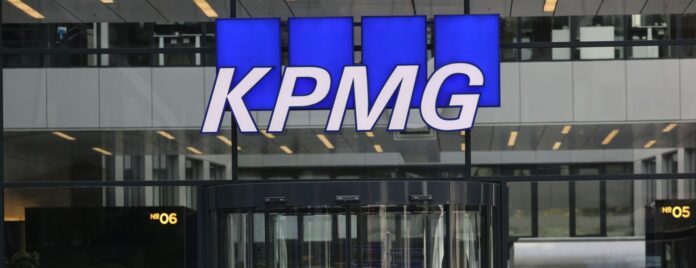KPMG envisions expanding its legal business by surpassing major law firms in investment on artificial intelligence tools.
The Big Four consulting firm plans to allocate “tens of millions of dollars” to aid corporate legal departments in streamlining operations by incorporating generative AI, as stated by Stuart Fuller, KPMG’s head of legal services, in an interview. He believes this technology will eventually replace certain tasks typically assigned to junior lawyers, potentially impacting the core business model of law firms.
“The key distinction between a Big Law firm and the Big Four is the access to capital for investing in technology solutions and AI,” Fuller explained in the interview. “Creating and investing in AI solutions requires capital.”
KPMG published gross revenues exceeding $36 billion last year, more than five times the revenue of the largest law firms globally.
Although the Big Four have emerged as competitors to Big Law firms over the past decade by expanding their legal services, they are still limited in practicing law in most of the U.S. and have not posed a significant threat to elite law firms.
Fuller oversees 3,850 legal professionals in 84 locations at KPMG Law. Previously, he held the position of global managing partner at King & Wood Mallesons, a prominent firm in the Asia Pacific region.
Generative AI tools are anticipated to accelerate certain legal processes, improving efficiency and reducing costs, according to Fuller. The partnership with Microsoft announced in November aims to leverage the tech giant’s AI capabilities for corporate legal departments.
“Generative AI has the potential to significantly transform the core aspects of legal work, which are language and words,” Fuller expressed. “The impact of this technology is profound.”
Investing in AI
Fuller, based in Australia, joined KPMG Law in 2018 and assumed the role of global head of legal services in the following year.
He mentioned that KPMG Law experienced a revenue increase of 10% to 15% last year, without specifying the exact figure. The company’s legal services segment expanded in the Asia-Pacific region in late 2022 through the addition of 275 lawyers from Zico Law.
Legal services is among the sectors identified for growth in a recent companywide strategy review, prompting the substantial investment Fuller mentioned. To justify this investment, KPMG Law is focusing on revenue growth, the proportion of large KPMG clients utilizing legal services, and client feedback.
While legal tech companies have heavily invested in generative AI, discussions among law firm leaders, like the ones mentioned, have yet to result in significant impact.
Fuller highlighted that any potential generative AI transformation is still in its early stages. He is focusing on educating his workforce about this technology and implementing a global training program in collaboration with Microsoft.
He foresees the market consolidating around a few AI technology providers, with the differentiator being the ability to effectively utilize internal data to maximize the tools’ potential, such as historical advice from law firms.
“We now require individuals who are intellectually curious about the evolving legal landscape and adaptable in their thinking,” he stated.
Transitioning Model
The enduring business model of Big Law has proven resilient despite previous predictions of its demise, as warned by Fuller.
He anticipates clients pressuring law firms to utilize generative AI for tasks it can execute more efficiently and affordably compared to traditional junior lawyer work. This shift may challenge the traditional billable hour model, creating potential friction between law firms and their clients.
While law firms seek a return on their technology investment, clients expect to benefit from the cost savings generated.
“This presents both an opportunity and a challenge,” Fuller explained.
Bloomberg Law competes in this market and offers AI-based tools for contract solutions.
